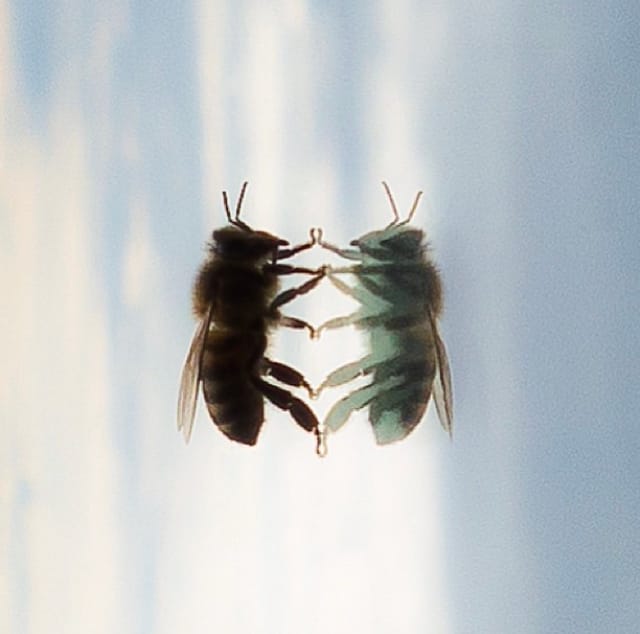The phrase, “An apple a day keeps the doctor away,” has been around for centuries and is still used to encourage healthy eating. There is scientific research that proves garlic has medicinal qualities. Studies imply that the consumption of sweet potatoes may help prevent cancer and improve insulin sensitivity, in those with diabetes. And the list goes on…
The overall message?
To maintain good nutrition, one should consume a variety of plant-based foods. All of the above mentioned are still readily available in most parts of the world, but the one thing they—along with a number of other vegetables, berries and nuts—have in common, is their dependence on bees for survival. And sadly, bees are in big trouble.
On this World Bee Day, we dissect the multiple ways bees contribute to nature and humanity, examine what is causing the rapid decline of their species, and offer ways we can help replenish the bee population, before it’s too late.
Bees and Their Benefits
There are many negative connotations associated with bees—if we’re obsessed with something, we may have a ‘bee in our bonnet’ – If we’re in pursuit of a target of some sort, we ‘make a bee-line’ for it.
These days ‘drones’ are used as weapons of war…
The truth is, bees are one of the most dynamic species on the planet and we rely upon them far more than we probably realise. Put simply, our ecosystem can’t fully thrive without them.
For example: According to the United Nations, 75% of the world’s food crops are dependent on pollination, as well as 90% of the world’s flowering plant species. Flowers and plants that provide habitats for other living creatures. You see where we’re going with this…
Translation: If the bees die off, say goodbye to salads, because there won’t be any more lettuce, cabbage or cucumbers. It will be difficult to make granola bars since almonds and honey will cease to exist. Smoothies won’t be the same without blueberries, blackberries, strawberries, or stone fruits like peaches.
If that weren’t upsetting enough, bees make our world better by helping humans in several other ways:
- To fight PTSD
- To help heal wounds
- To reduce inflammation
- To provide us with (no kidding) lessons on feminism and more…
There are also clinical studies in progress, to learn if bee venom is effective in treating Parkinson’s Disease and other neurological disorders. As science evolves, there may be even more positive discoveries associated with bee benefits.
Stats That Sting
Currently, the International Union for Conservation of Nature (IUCN) lists 6 bee species as Critically Endangered; 9 as Endangered and 10 as Vulnerable. This implies that without significant intervention and protections put in place for the species’ in jeopardy, they may go extinct.
For reference, in centuries past, bee populations would suffer an average annual decline of 10 – 15%, due to cyclical environmental factors. Since 2006, beekeepers have reported that these declines have more than doubled, with 30% – 60% of bee colonies lost, each winter!
Hive Horrors
So, what is killing the bees at such a rapid rate?
Unfortunately, a number of things:
Pesticides
Though environmentalists have sounded the alarm for decades, the ‘norm’ is still to use harmful pesticides, to farm large crops. These chemicals not only kill bees, they pollute waters that harm birds and fish, plus contaminate our food supply with toxins.
Climate Change
Because of the increased temperatures on the planet, which cause droughts and intensify other weather events, bee habitats needed to sustain the health of their colonies are sometimes lost to the elements.
Pathogens
Just like humans, bees can suffer from contracting viruses and parasites. They are more likely to be subject to these pathogens when their immune systems are weak, which happens when they are malnourished. Their lack of nourishment is a result of whatever is happening in their host environment.
Low Genetic Diversity
When bees do not mingle and mate with a variety of partners, their DNA weakens and becomes less able to adapt to evolving environments.
Colony Conservation
Though the news of the day may seem grim, there are ways we can do our part to help save the bees:
- We’ve discussed the importance of regenerative agriculture and the film Kiss the Ground, which has evolved into a grassroots movement. By following those principles (if you’re a farmer) or purchasing organic foods from farms that adhere to these practices (if you’re a consumer), we encourage more farmers to return to nature and adapt regenerative practices to produce their crops, thus reducing and eventually (fingers crossed) eliminating the use of pesticides altogether.
Innovation can also provide optimism.
A teenager in California experimented with a theory about how to restore a bee’s memory that has been damaged by pesticides … and it worked! See how implementing her method could have a major impact on preserving and restoring bee colonies:
- At home, you can create a bee-friendly habitat in your yard, or strike up a beekeeping hobby and host your own hive.
- If attracting the bees to your own space isn’t realistic, you can support local beekeepers by buying local honey and beeswax products they produce with the bounty from their hives.
- Alternatively, if you suffer from a bee allergy, or have a hive that brings danger to your surroundings, you can move the hive without killing the bees.
Though the news may be a real buzzkill … There’s still time to save the bees.
Photo by Julian Lennon, 2013. View over 12,000 of Julian’s photographs on Instagram (@julespicturepalace).


